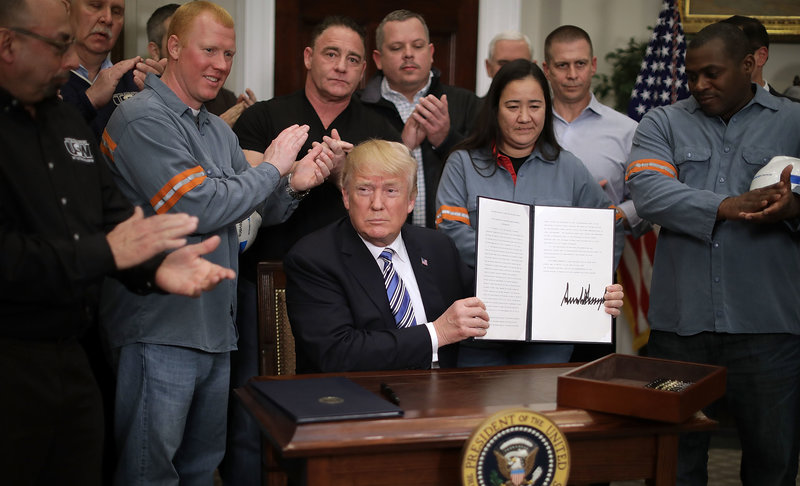President Donald Trump’s new attempt at putting America first is going to hurt the economy.
Making good on his campaign promise, last week Trump signed an order creating a new tariff on steel and aluminum, going against his economic advisors. The tariff would be a 25 percent tax on steel, and a 10 percent tax on aluminum, entering the country from anywhere in the world. The only countries that would be exempt would be Canada and Mexico.
“A strong steel and aluminum industry are vital to our national security, absolutely vital,” said President Trump in a news conference. “Steel is steel. You don’t have steel, you don’t have a country.”
Indeed the growth of the steel industry is important, but such a tax on imported steel would only impede economic growth instead of fostering it.
Trump’s tariff stemmed from a 2017 Commerce Department report, which claimed that lower quality metal imported at a lower cost than that available within the United States, presented a threat to U.S. national security by undermining the U.S. manufacturing base.
If President Trump were to institute a tariff, it would effectively raise the price on incoming steel and aluminum. Therefore, American manufacturers would be better able to compete against global consumers, and more likely to save American jobs… in theory.
Simply put, American steel and aluminum costs more to produce, and in turn will increase the consumer cost. On the production end, industries related to steel and aluminum are more likely to lay off workers in order to accommodate for increased costs.
Such policies have been tried before and they have failed disastrously. Both former Presidents Bush and Obama placed a temporary tariff on steel in order to curb Chinese imports. As a direct result, the U.S. steel industry experienced little to no job growth and consumer prices rose sharply. Naturally, by increasing the price of steel, the prices of everything else made from said steel also skyrocketed.
The estimated job loss from these price increases in the Bush administration alone was 26,000-200,000 jobs. Furthermore, studies about steel
protectionism in the United States in the 1970s concluded that consumers paid an additional $290,000 for every single American job that was saved in manufacturing.
President Trump loudly proclaimed that the tariff was not only created to save American jobs, but also to stop low quality, low price imports of Chinese goods. However, it turns out that China is only the 10th largest supplier of steel in the U.S. economy. In fact, South Korea exports almost three times as much steel to the United States as China does. This tariff is not only going to hurt China, but every other country that exports steel to the United States, including our allies.
While competition among U.S. steel and aluminum production companies will increase, overall the competition on the international stage is going to decrease. Other countries will no longer try to sell their steel and aluminum to the United States because the new tariff would no longer allow them to yield an attractive profit. U.S. companies will never be able to match the low prices of international producers given the minimum wage laws and environmental regulations.
Now let us take a minute to think about what the steel and aluminum economy would look like without tariffs. Tariffs essentially serve as a shackle on the ankles of production companies; once we remove import tariffs, production companies will compete in a free, global market with the goal of low prices.
A decrease in the costs of aluminum and steel products would ultimately increase jobs in industries that rely on those products. For example, the price of beer would decrease because the drop in price for aluminum would open up more capital for business expansion. Thus, companies like Samuel Adams, or your local brewery, would be able to hire more employees to increase production. Beer retailers would be able to sell beer at a lower price, and make 91 million beer consumers in America happy.
The only way to ensure we as Americans see economic growth, in terms of more jobs and lower costs, is to allow the free market to work and foster healthy competition. Trump’s tariff is going to do the exact opposite; perhaps, he should have listened to his economic advisors.



